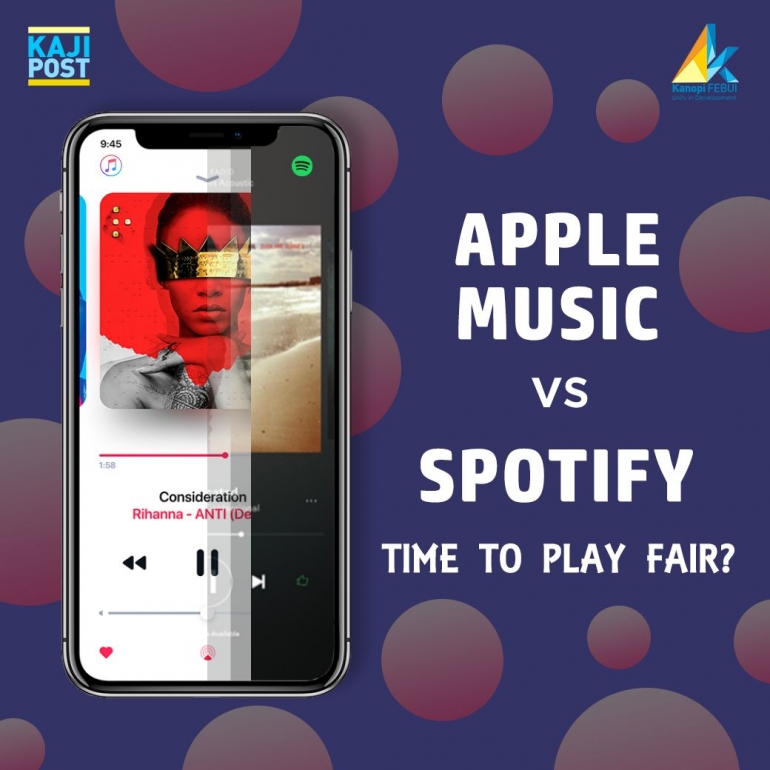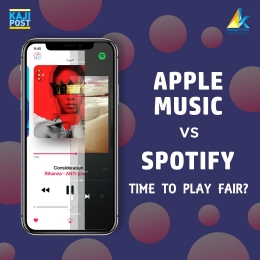Music Streaming Apps Rule
Nowadays, people around the world use music streaming applications (apps) regularly. Studies have shown that there are currently more than 1 billion of its users worldwide, and the number is predicted to increase to 1.2 billion by 20231.
This greatly contributes to its revenue of a staggering US$ 11.1 billion2. There is a multitude of reasons why streaming apps are preferable to the traditional DVDs and CDs; they can provide over 30 million up-to-date songs in just one device, users can listen to songs everywhere since smartphones are mobile, they are easily accessible for musicians who want to publish their songs, and many more3.
Albeit it provides convenience for the users, thanks to advancement of technology, there has been a major controversy that circulates around the music streaming applications market.
Apple Music versus Spotify, two giants of music streaming apps, are accusing each other for their own reasons. On one hand, Spotify accused Apple for not levelling the playing field.
On the other hand, Apple fired back by saying that without App Store, Apple's digital distribution platform that allows Apple devices' users to buy apps, Spotify would not have become the world's most popular music streaming app. How did the conflict between the two happen? What action did Apple do that angered Spotify?
Goliath vs Goliath
The altercation started in 2010, two years after Spotify became available on App Store4. According to Spotify, Apple started to change App Store's terms and regulations and interpreted it in such a way that it would disadvantage rival apps, such as not allowing the apps to include a "buy" button that redirects away from App Store. Apple had and still has the authority to do so as the iOS platform, Apple's software which includes App Store, is owned by Apple5.
From then on, Apple started complicating Spotify in doing their business. The most infamous incident would be the Apple tax, 30% tax which was imposed to developers using App Store to market their product, including Spotify.
This forced Spotify to inflate its price by 30% from $10 to $13 which drove down the demand for Spotify in the App Store. Furthermore, in 2015, Apple denied Spotify's proposal to include Spotify on Apple Watch, which they had finally done so 3 years later.
In 2017, Spotify got rejected by Apple for promoting "get 3 months now for 0.99", despite only directing users to a landing page without information on where or how to purchase Premium feature (which Apple had allowed only a few months prior) yet Apple allowed Apple Music (opened on June 30, 2015) to do the exact same promotion. The last straw was when Spotify got blocked again, this time for enabling podcast recommendations.
In the end, Spotify filed anti-trust complaint to European Commission two months ago. Spotify founder and CEO, Daniel Ek, wrote on Spotify's newsroom about his frustrations towards Apple and his claim that by levelling the playing field, "Competition pushes us to evolve and improve both the customer and creator experience. It's not something we ever have---or will---shy away from."6.
In response to Spotify's so-called rant, Apple fired back. On Apple's newsroom, they claimed that Spotify wants to keep all the benefits of using App Store without contributing much to the marketplace itself. Apple also rebutted Spotify's statement on Apple Watch by saying that they have offered them help to start up its app on Apple Watch whatever they could.
They also stated that they processed Spotify's request to be in the watch the same way as other apps and in fact, Spotify is currently the number one app in Watch Music Category7. In the end, Apple lambasted that Spotify wouldn't be the business that they are today without the App Store's mechanisms, implying that Spotify owes Apple for being so popular among smartphone users today.
Competition Indeed Drives Innovation
Although one cannot be sure whether Spotify is totally correct or vice versa, one thing for certain is that Apple Tax indeed hurts other music app developers as it creates unfair playing field by directly pushing down demand for other music streaming apps. This idea is supported by many other developers.
However, regarding the CEO's claim that essentially means competition, or levelling the playing field, pushes innovation, must be proven with appropriate research and empirical results.
Spotify and Apple Music are neck-and-neck firms whereby both apps have the same technology needed to develop them respectively and the service offered. In this case, it is believed that competition indeed drives high innovation and based on experiment it is proven to be true, assuming the experiment is done under infinite horizon (Aghion, Bechtold, Cassar & Herz, 2018)8.
This means that under no time constraint, companies, especially the neck-and-neck types will constantly improve to be one step ahead, resulting in, for the case of Spotify and Apple Music, much more innovative apps for the sole purpose of attracting potential users and therefore increase profit.
For example, Microsoft's Windows allows users to download third-party web browsers such as Google Chrome and this allows them to innovate by improving its web browser; it rebranded its web browser from Internet Explorer to Microsoft Edge with various improvements and friendlier user interface to attract users back to using its own browser. Therefore, by allowing competition in the App Store, Apple Music will be able to innovate to create better app to attract more potential users.
However, one shall see the perspective of the other side. Apple implements its infamous tax not just on music streaming apps like Spotify, it also does on all third-party apps that utilise the functionality of App Store.
Assuming that all the revenue goes to Apple, not only they use it to improve Apple Music, it is also used to maintain App Store itself. Without money, Apple will not be able to run many of its apps and App Store which will eventually disallow Spotify to promote its app to Apple users and it will ironically hurt Spotify's revenue.
Start Innovate!
Although implementing such tax is fairly reasonable, other aforementioned Apple's acts remain unreasonable. It is still obvious that Apple abuses its power to monopolise music streaming apps market in App Store. One solution to resolve this issue is that Apple can maintain its tax but it should revise its App Store's Terms and Conditions (T&C). It is proven that it constantly changes its T&C to give leeway for Apple Music and make other apps harder to promote.
This is the main cause of the unfair playing field. Although it is legal, it is very unethical and unprofessional. By modifying its T&C, it levels up the competition and thus allowing every music streaming app to innovate. Knowing the benefits of competition, it is now the time for Apple to drop the ego and start innovate!
Oleh Christian Anugrah Leonardo | Ilmu Ekonomi 2018 | Staf Divisi Kajian Kanopi 2019
REFERENCES
- Music Streaming - worldwide | Statista Market Forecast. (2019). Retrieved from https://www.statista.com/outlook/209/100/music-streaming/worldwide#market-users
- Music Streaming - worldwide | Statista Market Forecast. (2019). Retrieved from https://www.statista.com/outlook/209/100/music-streaming/worldwide#market-revenue
- Pros and Cons of Music Streaming. (2019). Retrieved from https://www.gigmit.com/en/for-bands-and-djs/guide/pros-and-cons-of-music-streaming/
- Timeline - Time to Play Fair. (2019). Retrieved from https://www.timetoplayfair.com/timeline/
- Silver, S. (2018). Apple details history of App Store on its 10th anniversary. Retrieved from https://appleinsider.com/articles/18/07/05/apple-details-history-of-app-store-on-its-10th-anniversary
- Ek, D. (2019). Consumers and Innovators Win on a Level Playing Field --- Spotify. Retrieved from https://newsroom.spotify.com/2019-03-13/consumers-and-innovators-win-on-a-level-playing-field/
- Inc., A. (2019). Addressing Spotify's Claims. Retrieved from https://www.apple.com/newsroom/2019/03/addressing-spotifys-claims/
- 8Aghion, P., Bechtold, S., Cassar, L., & Herz, H. (2018). The Causal Effects of Competition on Innovation: Experimental Evidence. The Journal Of Law, Economics, And Organization, 34(2), 162-195. doi: 10.1093/jleo/ewy004
Baca konten-konten menarik Kompasiana langsung dari smartphone kamu. Follow channel WhatsApp Kompasiana sekarang di sini: https://whatsapp.com/channel/0029VaYjYaL4Spk7WflFYJ2H







